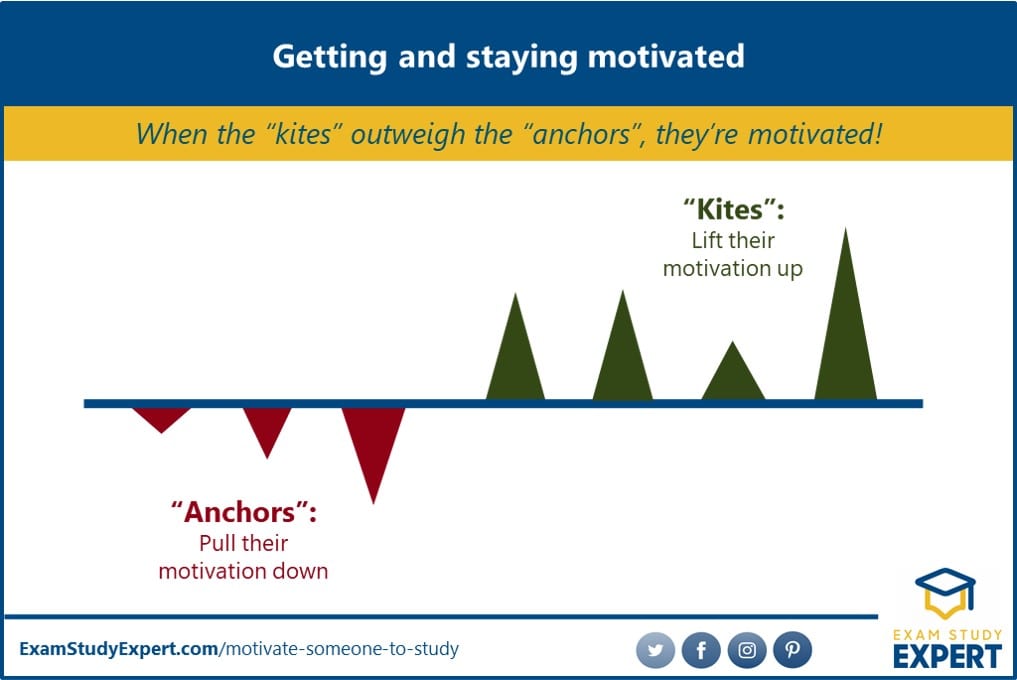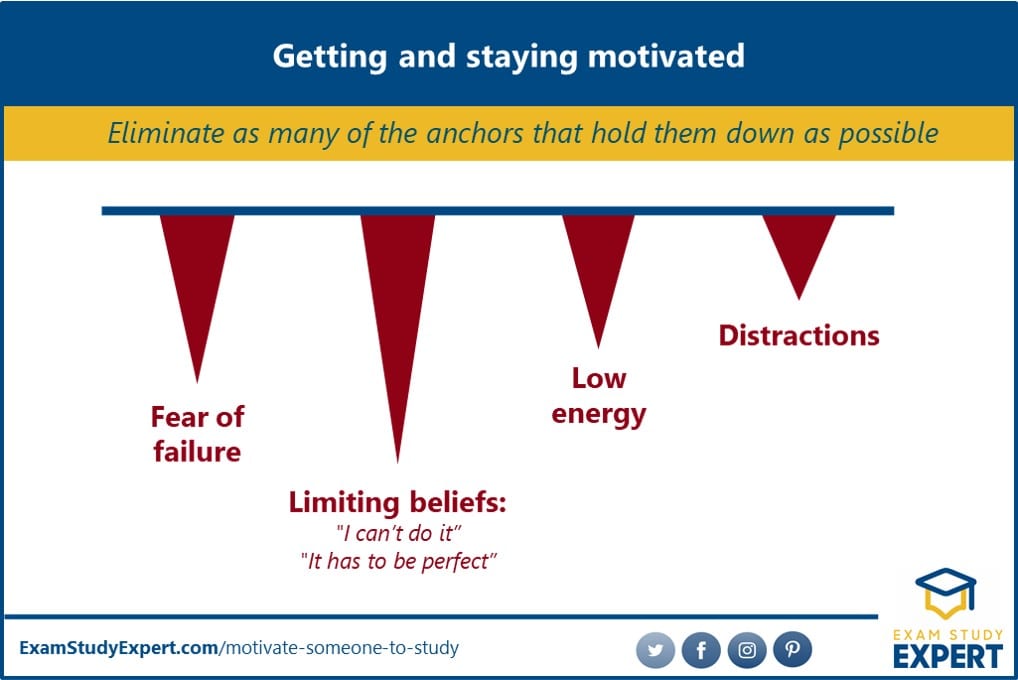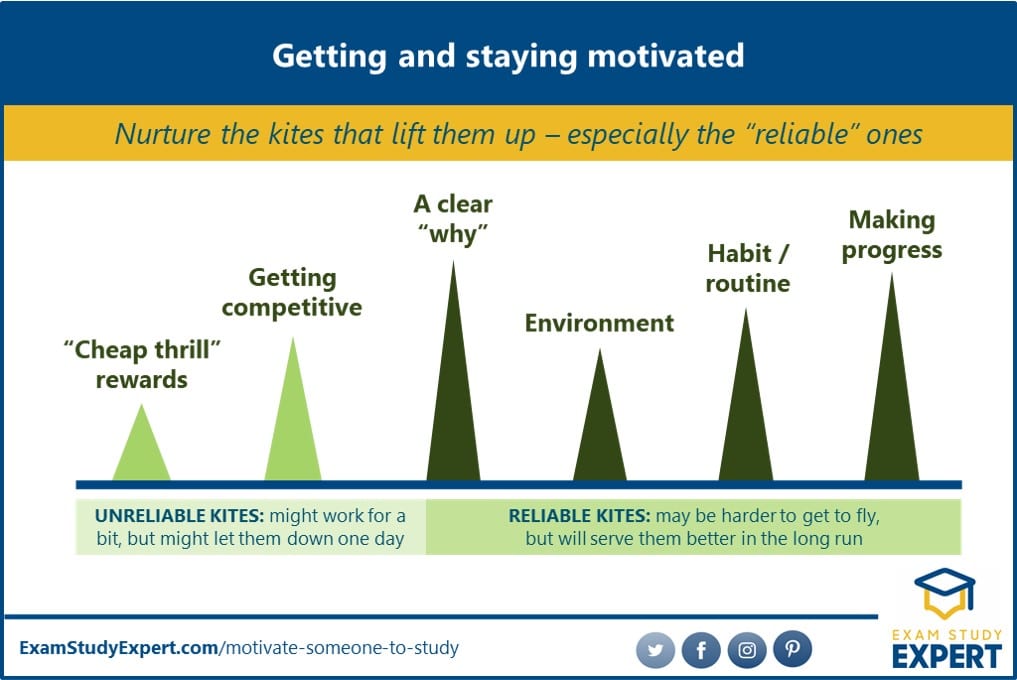As a study success coach, psychologist and parent, I truly understand the frustration of seeing a child, teenager or young adult underperforming in their studies and exams. Whether your child is struggling with their revision, procrastinates wildly, or doesn’t do any homework at all unless you nag them: I can help.
As someone who’s helped many a student find their get-up-and-go, getting someone motivated to study relies on winning two battles: shrinking their anchors and inflating their kites. Let me explain:
By William Wadsworth, the Cambridge University trained cognitive psychologist and specialist in how to study smarter, not harder. He leads the world’s largest research study on use of effective learning strategies, is regular exam prep expert for The Times, and hosts the Exam Study Expert podcast, with 1 million downloads to date.
Additional research, graphics and article review by Dr Kerri-Anne Edinburgh
How to motivate someone to study starts with understanding their “kites & anchors”
When I’m working with a student (or their parent) on their motivation to study, everything comes down to two sets of factors: the kites and the anchors.

Think of your child’s study motivation like a set of scales.
On the one side, you have the “anchors”: these are factors that pull your child’s motivation down and kill their drive to succeed.
On the other side, you have the “kites”: factors that lift your child’s motivation up, and give them a thirst to pursue their goals.
If you’re working to motivate someone to study, you want to start by identifying the factors at play, then shrinking the “anchors” that are dragging motivation down whilst maximising the “kites” that give motivation a boost.
Here’s how:
Improving motivation to study by casting off the “anchors” holding them back
Here are the top four anchors you need to look out for, and some tips on how to combat them:

1. Fear of failure
One of the heaviest, and most common, anchors, fearing failure is often a reason students don’t try at all.
Fear can make your child feel overwhelmed or defeated and kill their motivation to study.
The best way to combat fear of failure is to make sure your child has all the tools and support they need to get motivated to study effectively and get results they are proud of:
- Encourage self-belief in your child with a family culture that shouts: “It’s OK to make mistakes, they are an essential part of learning!”
- Somewhat counter-intuitively, being too fixated on a single goal or success criterion can actually be a good way to decrease your child’s motivation to study, not increase it.
- Help them find a viable Plan B in case Plan A doesn’t work out, so they’re less scared of the process.
- Choose an inspirational quote about facing the possibility of failure, and put it up in your child’s study space
- Find the perfect example with these collections of inspirational and motivational quotes.
- Celebrate endeavour even if it doesn’t lead to success!
Remember, true masters at anything in life have failed more times than most people have tried. Failure is part of the process of success, provided you’re failing well – in other words, putting forth effort, and learning from what works and what doesn’t.
2. Limiting beliefs (“I can’t do it”, “It has to be perfect”)
Another weighty anchor, limiting beliefs stem from having a natural but unhelpful “fixed mindset”.
Encourage your child to develop a “growth mindset”, that emphasises their ability to learn, grow and change. My podcast episode with Dr Erika Patall provides a great summary, and you can find some valuable resources from my bookshelf here, or explore the subject with our handy (and tip-packed) guide. I really recommend reading Carol Dweck’s engaging book Mindset, the seminal text on “growth mindset”.
An effective method of challenging limiting beliefs is to help your child be honest about them (even if it feels painful to confront them!):
- Together, discuss and write down all of the things they believe about their abilities, potential and work ethic. Unpick them critically, finding at least ONE reason each belief is untrue.
- For example: “I’m bad at French” BUT “I can get better with regular practice!”
- Play the “yet” game as a family – any time negative self-talk rears its head in conversation, add the word “yet”:
- “I can’t do Math(s)” becomes “I can’t do Math(s)… YET” – being realistic about present shortcomings, while also offering a reminder of a brighter future that’s possible – with the right practice!
The goal is to help your child develop their own, internal confidence in their abilities. Until they do, remind your child every day of their potential!
3. Low energy
An unmotivated student is often one struggling with fatigue and apathy.
For a short-term fix, going for a walk can be a great way to take a break whilst getting some endorphins!
But you need to keep your child’s energy high every day – especially during revision and exams. How?
- Help your child to develop good sleeping and resting habits – breaks are important!
- Encourage regular exercise – yoga can be a great tool for building physical and mental energy.
- Boost their mental well-being with family support and active listening.
- Encourage them to eat regularly and prioritise the right foods – berries, nuts and dark chocolate provide a perfect brain-boost!
- Hydration is also really important – make sure there’s a water bottle on hand during study sessions.
4. Distractions
Multitasking used to be trendy: the idea being that you get more done by doing lots of things at once.
But a brain that’s 100% focused on the task at hand is actually able to accomplish more, in less time, and to a much higher standard, than a brain that’s only half focused.
This anchor sounds simple to solve in theory: just get rid of the distractions!
But conquering the distractions can be much easier said than done.
Here are 5 quick strategies that can really help to get on top of external distractions and help your child get motivated to study:
- Set up a study space that minimises environmental distractions – phone off, console unplugged and out of sight.
- Listening to music can be a great help for focus when studying, especially if there’s external noise.
- “Focus apps” can help to structure their time and block social media.
- Try the Pomodoro method as a great way to get started with manageable chunks of studying!
- Mindfulness training is a fantastic way to build up a student’s ability to focus harder and for longer.
Boosting study motivation through “kites” that help them soar
We want to tip the balance of your child’s motivational scales heavily towards the kites.
Why? Because when the kites outweigh the anchors, your child will be riding a perfect – and sustainable – motivational wave. And THAT is our goal.
However, there is a caveat. some kites are reliable – they might be harder to get to fly, but they are guaranteed to serve your child better in the long run. Other kites are unreliable – they might work for the short-term, but they aren’t effective or sustainable as methods to motivate them to study.
Here are the top 6 kites to look out for, and some expert tips to get them flying:

1. The promise of a “cheap thrill” reward
Having a system of rewards and punishments is an often-used motivational tactic amongst students and their parents.
Rewards of sugary treats or gaming time, in exchange for a session of studying.
Threats about negative consequences if the work doesn’t get done.
Dangling a carrot (promise of reward) or wagging a stick (threatening a punishment) can certainly get the proverbial donkey to pull the cart.
The problem is that they’re likely to quickly come to resent both the task and the one wielding the carrot / stick, in other words, undermining any intrinsic motivation to study..
Keep in mind that rewards are an unreliable kite – although they can be an helpful short-term solution if used alongside other motivational tools.
It is best if rewards and punishments are devised and enforced by the student (rather than their parents) as far as possible – learn more about why in this podcast with Dr Erika Patall.
2. Getting competitive
The second unreliable kite is competition. It is highly effective in the short-term – believe me, I would never have turned my grades around and aced my school exams without the desire to outdo my closest rivals!
A little healthy, self-led social comparison is a useful tool in your child’s developing drive to succeed. BUT comparison driven by authority figures (parents and teachers) can easily backfire and destroy confidence.
It is also important that competition doesn’t consume your child, as this may lead to them suffering academically or psychologically at later stages of their academic career.
If your child must compete, then encourage them to compete with their own past performance. Swim their own lane.
3. A clear “why”
Knowing “why” they want to succeed is one of the most powerful and reliable kites your child can have. A “why” can turn vague goals into driven ambition and study motivation.
However, these reason(s) might not always be obvious. Encourage them to brainstorm why studying matters to them:
- What skills is it directly teaching?
- E.g. being able to speak French while on holiday.
- What will success mean for their future?
- E.g. unlocking their preferred University / college / career path. (If they don’t know what this is… then take some time to have a think!)
- What traits is it building?
- Even if the direct skills of the subject might not be hugely useful in the real world or their future career, might the subject be teaching resilience, problem-solving, ability to overcome a challenge, make sense of complex concepts?
- What will success mean for their sense of achievement, pride, confidence? How will it feel?
As a last-resort for overcoming a stubborn bout of procrastination on a task, flip this exercise round, and have them brainstorm the costs of not getting the work done!
4. The right environment
As we’ve already learnt, the right study environment can be key to avoiding distractions. It can also provide a much-needed boost to your child’s motivation, mindset and focus.
A great starting point for creating a helpful study-conducive environment at home is the behavior you as parents model for your children.
It might not be the most comfortable activity, sure, but ask yourself whether you display the behaviours you’re trying to encourage in your children: Do I (also) spend too much time on a screen? Is our family’s free time spent on stimulating hobbies? Do I help with their homework?
Don’t forget that you, as a parent, can have a hugely positive impact on your children’s academic success, environment and mindset.
Beyond this step, there are plenty of options to maximize your child’s study environment:
- Encourage them to study in a space where other students work – such as the library!
- Help them arrange a dedicated study space at home. Experiment together with different places and layouts – even times of day – to minimise distractions and inspire focus.
- Support their mental space and well-being by equipping them with tools and resources:
- Active listening, meditation, journaling, getting outside, having someone to talk to!
- I often recommend Headspace as a great tool for students and parents to help manage mental well-being: you can learn more about it with my honest, thorough review.
5. Study habits and routines
A key kite for long-term motivation and drive in students is the development of routines and habits.
I’m a huge fan of the power of routines, because they make behaviours (like studying) more automatic; a “willpower-free” way to achieve success.
You can support your child cement good study and revision habits by:
- Help them set up organisational and planning tools to make studying feel more manageable.
- Work together to set out a timetable of regular study sessions – include plenty of time for extracurriculars and breaks to ensure long-term sustainability.
- Expert study coaching is a great way for you and your child to learn effective study habits.
Most importantly, support your child in reflecting regularly on what is and isn’t working, and help them to make changes!
6. Making progress
Progress is a fantastic motivator, BUT it can often be hard to see – especially in the midst of revision.
Luckily, there are some proven practical ways to make progress visible:
- Help them learn to break down big tasks with milestones, to check off as they’re achieved. If the milestones are too big or far away, break them down even further – “inch-pebbles” as I call them!
- Encourage your child to track their progress on these smaller tasks with regular (weekly or daily) goal-setting, and then acknowledging their achievements together
- Not all progress needs to be outcome-related. Sometimes it could just be measured by the effort made – words per day of a big assignment, minutes per day of language learning.
- Have a way to track the progress: there are many tools to do this digitally, but I’m a big fan of getting it up on the wall – ticksheets, checklists, wall-charts to collect gold stars (I don’t care how old your child is..!).
Celebrating progress (especially small steps) is a great way to bolster your child’s growth mindset and quell limiting beliefs.
Summary: how to motivate someone to study
The power of the “Kites and Anchors” model is its flexibility. Motivating a child or teenager to study doesn’t have a one-size-fits-all silver bullet, but by learning to recognise the factors that are most important to influence and boost your child’s motivation to study, you’ll be able to spot what matters most, and work on that.
Here’s a summary of the kites and anchors to look out for:
- Anchors:
- Fear of failure
- Limiting beliefs
- Low energy
- Distractions
- Kites:
- “Cheap thrill” rewards
- Competition
- A clear “why”
- The right environment
- Making progress
Your next steps:
If you’d like support in motivating your child to study, please click here to learn more about 1:1 Study Success Coaching. Parents are able to do incredible things to support their children in their studies, but it can often be helpful to work alongside external expertise too:
- As a Cambridge trained psychologist, I understand the science of motivation, and how to harness the right factors in the right circumstances.
- Your child is unique, but with a decade’s experience working 1:1 with students on how they approach their studies, I’ve learned what works and what doesn’t for a wide range of different types of individuals.
- A fresh, outside voice from beyond the family can often be valuable in getting positive change to stick.
Learn more and read recent testimonials by clicking here – and it would be a pleasure to help your family achieve their academic potential too. You’re welcome to book a no-obligation consultation with me any time to discuss your circumstances and how I may be able to support.
And please leave a comment below if you’ve found this explanation of kites and anchors helpful: I’d love to hear from you!
Wishing you and your family every success in their studies.

By William Wadsworth, the Cambridge University trained cognitive psychologist and specialist in how to study smarter, not harder. He leads the world’s largest research study on use of effective learning strategies, is regular exam prep expert for The Times, and hosts the Exam Study Expert podcast, which has 1 million downloads to date.
Author Profile | About Us | Editorial Policy | Contact Us



This post is incredibly helpful! I love the practical tips provided, especially the idea of setting small, achievable goals. It’s so important to celebrate those little victories to keep motivation high. Thanks for sharing these insights!
Thanks for stopping by, and for the kind words! Wishing you every success 🙂